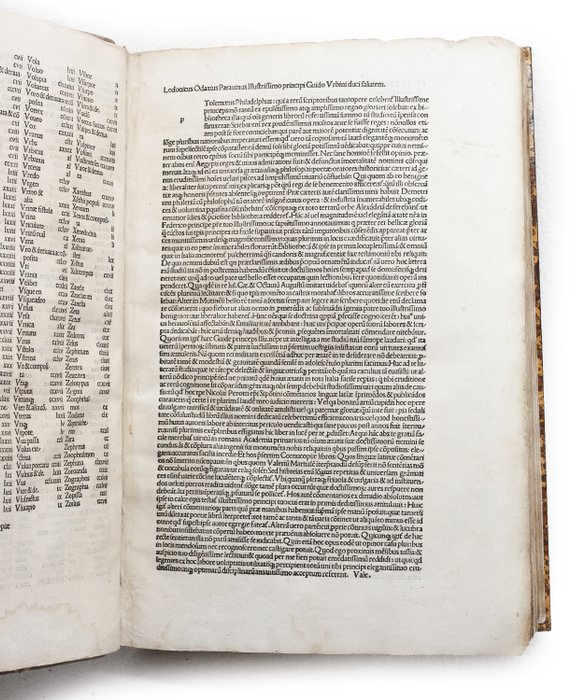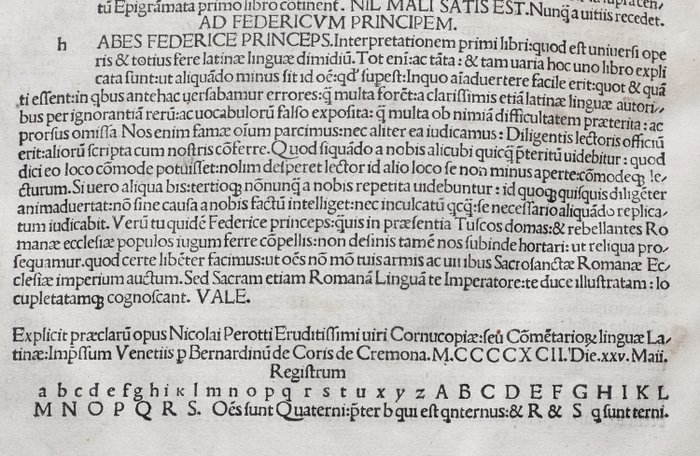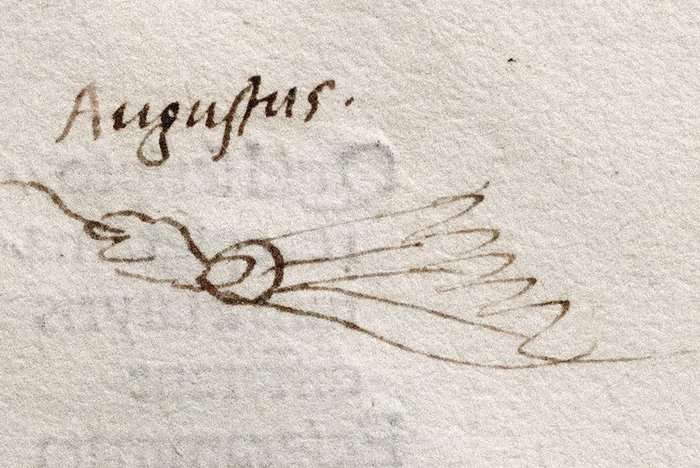Advert Description
Are you interested in this item? This item is up for auction at Catawiki. Please click on "respond to advert" (orange button) to get redirected to the Catawiki website. Catawiki’s goal is to make special objects universally available. Our weekly auctions feature thousands of unusual, rare, and exceptional objects you won’t find in just any store. 1492 - INCUNABLE IN FOLIO - MARTIALE'S EPIGRAMS COMMENTED BY THE HUMANIST PEROTTO
Beautiful and elegant edition of the most important work by Perotto; it constitutes a commentary on the Liber Spectaculorum and on Martial's epigrams.
It seems that Perotto had given up on finishing the commentary on some of Martial's epigrams because they were saturated with obscenity.
The work is printed with singular and very minute characters. Fresh, beautiful and clear copy, excellently preserved considering the practical use to which it was intended. * Sanders 5534; * Sandy "Classical Scholarships" II 71; * Baroncelli 24; * Conditioner "Origins of italics" pp. 79-101; * New "Alessandro Paganino" 60; * Choix 12181; * Panizzi Library 4449; * Brunet IV 506; * Graesse V 205; * bm. Stc. 499; * Adams P 723.[f49]
https://www.repertoriumpomponianum.it/textus/Perottus,%20Cornu%20copiae%20ed%20Sassoferratensis%201.pdf
CONTENTS
Incunabulum of the humanist Niccolò Perotto's masterpiece, the Cornucopiae, which began as a commentary on Martial, was transformed into a vast philological repertoire of the Latin language.
It was supposed to be a commentary on the Liber Spectaculorum and Martial's epigrams, but, due to the vastness of the subject, the author stopped at the Liber spectaculorum and the first - not complete - book of epigrams. A
second part was planned but no trace of it remains.
Written as a commentary on Martial's book Primo, it includes a discussion of nearly every word of the text, making it a standard reference work on the Latin language. “A massive encyclopedia of the classical world. Every verse, indeed every word of Marziale's text was a hook on which Perotti hung a dense fabric of linguistic, historical and cultural knowledge” Brian Ogilvie. “The Science of Describing: Natural History in Renaissance Europe”.
The work was revised and enlarged by Perotto's son Pirro and the first edition was published in Venice in 1489; the first Aldino in 1499.
Niccolò Perotto (1429-1480) was an Italian cleric and humanist, born and died in Sassoferrato. From 1451 to 1453 he taught rhetoric and poetry at the University of Bologna. In 1452 he was named Poet Laureate by Emperor Frederick III, in recognition of his welcome speech to the city. He was papal secretary from 1455 and archbishop of Siponto in 1458. Although his next career was that of papal governor, he continued his academic research, editing the works of the Roman writers Pliny and Martial.
In addition to his Cornucopia, he wrote a grammar of the Latin school, Rudimenta Grammatices (Pannartz and Sweynheim 1473), one of the earliest and most popular Latin grammars of the Renaissance. The three most important classical texts on the grammar and etymology of the Latin language are added to the Cornucopia.
“Varro's treatise is the earliest existing work on grammar. This great work, finished before Cicero's death in 43 BC, owes much to the Stoic teaching of Aelius Stilo. .. The first three surviving books are on etymology, book V on place names, VI on terms denoting time and VII on poetic expressions. Sandys I p. 179. Then the epitome of Sextus Pompeius Festus is added in 21 books of the encyclopedic treatise "De verborum significatione" by Valerio Flacco. Festus provides the etymology and meaning of many words, and his work sheds considerable light on the Latin language, mythology and antiquities of ancient Rome. The work concludes with the summaries of Nonius Marcellus.
example very nice and margined, on strong paper.
Famous and successful work, of the highly erudite philological commentary on 147 Epigrams of Martial (of the approximately 1200 that the Latin author composed). Perotti (Sassoferrato 1429-1480) was a famous humanist and grammarian, author of the most esteemed Latin grammar of Humanism (''Rudimenta grammatices''), archbishop of Siponto and Manfredonia and from 1474 governor of Perugia.
CONDITION REPORT
Non-coeval binding in mz. skin. Restored c. b2 and c. R4-5. Scattered gore and spots, red spot on cc. b10v-c1r. Frontispiece reproduced on vintage paper. Colophon on c. R5v. Some booklets in the center of the book have been wetted: on the lower margin of these pages (without affecting the text) some purplish shadows remain and the outer part of the lower edge has been professionally restored.
Folio - Text in 62-line font. Collated: Pp. (2); 20; 301 cards; (2); missing the first file a8-b1 and the last cc. R6-S6. Signature: b2-10 c–z8 A–Q8 R1-5.
Signature: a8 b¹° c–z8 A–Q8 R–S6. Imprint xvcv decv a:si infe (3) 1492 (R) IT\\ICCU\\VIAE\\047160.
FULL TITLES & AUTHORS
Nicolai Perotti Cornucopiae: siue commentariorum linguae latinae ad illustriss. principem Federicum Vrbini ducem: & ecclesiastici exercitus emperor inuictiss. Liber primus
Imp[re]ssum Venetiis p[er] Bernardinu[m] de Coris de Cremona MCCCCXCII die xxv Maii [25 May 1492].
Niccolo Perotto
Martial
Odasio, Lodovico
Perotto, Pyrrhus
Cori, Bernardino : de 67220435





